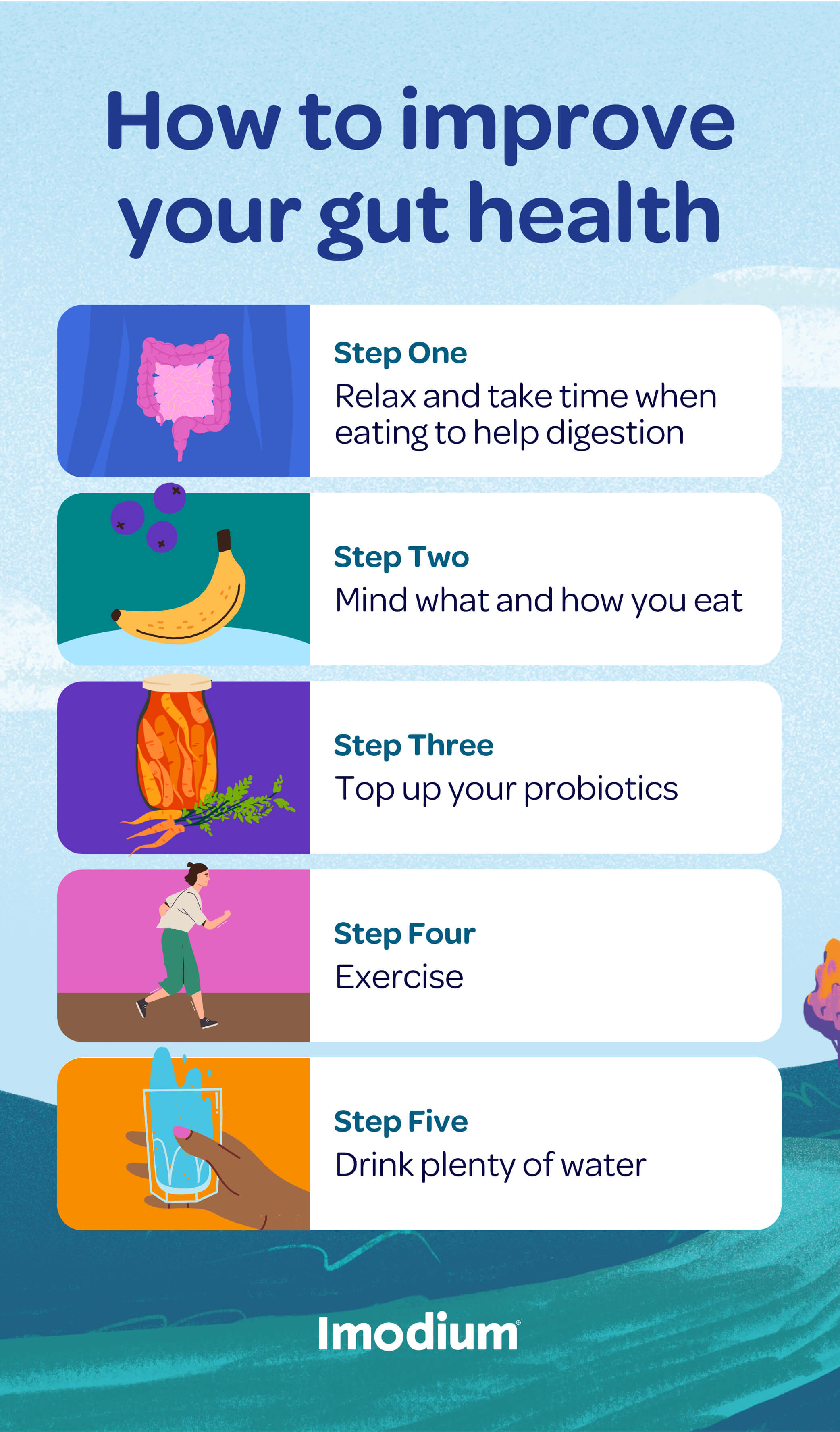Your gut health is important. The gut is made up of 300 to 500 different types of bacteria – each playing an important part in your overall health and wellbeing. Gut health can have an impact on different parts of the body, from your skin to your weight. That means a healthy gut can make a big difference to your body, from head to toe.
This page will cover why improving gut health is so important and offer some simple ways you can keep your gut healthy.
*We carried out an extensive survey of 2,000 UK diarrhoea sufferers to better understand and develop a support system for diarrhoea sufferers. The results of this study led us to create a comprehensive 28-day guide on how to improve your gut health. Find out more and take control of your gut today*
What is the gut?
The gut is a shortened term for the gastrointestinal tract, or the digestive system, which is made up of the pancreas, gallbladder and liver. Other organs that form the digestive system include the oesophagus, stomach, small and large intestines, and the rectum. However, when we speak about gut health, it’s specifically about the small intestine and large intestine.
Together, the digestive system cleverly breaks down our food and turns it into nutrients that provide us with the energy needed to keep us healthy.
Why a healthy gut is so important
Improving gut health is important, seeing as your gut health can have an impact of different areas of the body, from head to toe.
Your microbiome
The microbiome in your gut is like a home base for all the bacteria found throughout the digestive tract. It’s important to remember that both good and bad bacteria or “bugs” live in the body – in a healthy body, all will co-exist peacefully. Having good bacteria in the body helps to keep the bad bacteria in check, as they multiply so often that the bad bacteria have no space to grow.
Your microbiome is like your fingerprint in that it’s completely unique to you. It can change over time based on factors like diet or environmental exposures – and these changes can be potentially beneficial to your health.
Heart
Certain types of gut bacteria may play a part in heart health, due to the link between heart disease and cholesterol. Foods like red meat and eggs, which can cause a spike in cholesterol, create a chemical that your liver turns into trimethylamine-N-oxide (TMAO). This can cause cholesterol build-up in the blood vessels.
However, research has found that a natural substance called DMB – which can be found in some grapeseed and olive oils – could keep your bacteria from creating TMAO, thus contributing to a lower risk of diet-induced heart disease.
Kidneys
As well as TMAO contributing to higher cholesterol and potential heart disease, it can also lead to chronic kidney disease. People who already have the disease may also struggle to get rid of TMAO. A healthy gut could lead to a reduced amount of TMAO, and therefore, a lower risk of kidney diseas.
Brain
You know that saying “trust your gut”? Well, the gut is home to the enteric nervous system, which is also known as the second brain.
Researchers believe that when your brain sends messaging and signals around the body, the gut may speak back. The balance of bacteria could have an impact on the way your brain process senses and emotions. It’s also thought that changes in that balance could be a factor in conditions like chronic pain, stress, anxiety, and depression.
Signs of bad gut health
There are a few signs of bad gut health you can keep a look out for. These include:
Poor appetite
Difficulty swallowing
Stomach pain
Nausea
Bloating and cramps
Constipation
Vomiting and diarrhoea
Blood in stools
Weight loss or poor growth
Nutritional deficiencies.
These symptoms and side effects of poor gut health can also be related to other gastrointestinal conditions, such as coeliac disease and IBS. If you feel concerned that you’re experiencing the above symptoms, you should seek medical advice. Your doctor will be able to perform blood and stool tests to help diagnose a range of gut conditions.
How to keep your gut healthy

There are many ways you can keep your gut healthy. Below you can find some handy tips for maintaining and improving gut health.
Properly digest your food
When you’ve finished eating a meal, you should aim to be as relaxed as possible. Being in a relaxed state can help create gastric juice, which is essential to help your body absorb all those vital minerals, vitamins, and nutrients from your food. In fact, our recent survey on 2,000 UK diarrhoea sufferers established that nearly half of the respondents (47%) didn’t realise that eating food slowly can improve digestion. Taking the time to enjoy your food and savour every bite can help.
Mind what and how you eat
To aid digestion and prevent constipation, you should consider the relationship between your diet and digestive system. For example, eating healthier and reducing your intake of junk food is one effective way to boost your gut health.
According to our survey, eating a balanced diet is also essential, with 64% of respondents agreeing to this. Having pre-planned meals can help with this, as it’s a good idea to have fruit and healthy snacks to hand when you get hungry.
You should also try to increase the amount of fibre you’re consuming. You’re recommended to have 30g of fibre a day for a healthy bowel. Yet, despite such public health campaigns on fibre awareness, 40% of survey respondents didn’t know that eating plenty of fibre is important.
Sources can include fruit, veg, beans, brown rice, and wholemeal bread. Try to also incorporate foods containing omega-3 fatty acids, and sources of protein (like dairy, poultry, oats, and nuts) into your diet. These can help lower cholesterol and reduce bad bacteria in your microbiome.
Top up your probiotics
Probiotics are the ‘good’ bacteria – just like the ones in your gut – which can be found in certain types of food. They can add to the good bacteria in your intestinal tract to help keep your digestive system balanced. Recently, probiotics have gained a lot of popularity in the public domain, with 76% of respondents from our survey indicating that they were aware of probiotics.
There are some foods that are naturally rich in probiotics, including:
Dairy products like yogurt and aged cheeses
Fermented vegetables, like kimchi and sauerkraut
Pickled vegetables, like onions and gherkins.
You can also get live culture supplements but do bear in mind that these can work differently for each person. If you’re thinking about taking probiotic supplements, you should consult your doctor first, as people with certain health conditions may be advised to avoid them.
Exercise
Exercise can actually modify the gut with positive health effects. Recent studies suggest that an increase in low-intensity exercise can influence the gastrointestinal tract by reducing transient stool time. Exercise can also help with the growth of various beneficial bacteria in the gut – and this variety in bacteria can help promote health and potentially lower your risk of some diseases.
It’s therefore a good idea to exercise regularly – even if it’s just a short walk - and that’s what 53% of respondents from the Imodium survey realise, as they acknowledged that exercising regularly can improve gut health. This isn’t only beneficial to your gut and physical health but can also help to improve your mental well being too.
Drink plenty of water
Hydration is key if you want to improve your gut health, with 67% of respondents from the survey agreeing that drinking enough water is helpful. Drinking between six and eight glasses of water daily will help aid your digestive process. It helps encourage waste to pass through your system and soften stools, so they’re easier to pass. Try to drink a glass of water after each meal to help ensure you’re taking in enough fluids.
The 28-day guide to gut health

Why did we create this guide? Well, the numbers don’t lie. 64% of respondents from our recent survey expressed that they would like more support to better understand their gut health. Yet, despite this positive surge in wanting to improve gut health, 33% of people are still embarrassed to discuss their digestive health symptoms.
We also noticed some individuals look towards social media to get their health information: YouTube (15%), Facebook (12%), Instagram (11%), Twitter (9%), TikTok (9%). Some of these sources may have conflicting information.
As such, we’ve developed this guide to not only help you avoid misleading information online, but also to take control and heal your gut today.
WEEK 1:
1. Aim to drink around 2 litres of water per day
Drinking plenty of water helps soften your stool and improve the passage of waste through your digestive system.
2. Introduce probiotic foods
Probiotic foods may help revive a healthy balance of bacteria in the gut, whether from poor eating habits or illness and treatment.
3. Cut down your sugar intake
A diet with a lot of sugar can kill certain helpful bacteria in your gut, destroying the diversity of microbiota present.
4. Try breathing and mindful exercises to reduce stress levels
Breathing and mindful exercises help alleviate stress levels. When anxious or nervous, your body releases hormones that move into the digestive system, and these hormones can affect the microbiomes in your gut that aid in digestion.
WEEK 2:
5. Cut down your caffeine consumption
Drinks with a lot of caffeine can make the stomach more acidic, leading to effects such as heartburn in some people.
6. Introduce more fibre-rich food into your diet
Include more fibre-rich foods in your diet, such as oats, beans, brown rice, and wholemeal breads to prevent constipation and improve digestion.
7. Eat leafy greens such as spinach and kale
The insoluble fibres found in leafy greens such as kale and spinach reduce issues in bloating, constipation, and diarrhoea.
8. Drink herbal teas containing ginger or peppermint to aid digestion
Studies have shown drinking peppermint tea may help improve digestion by relaxing the muscles of the stomach, improving bile flow for better digestion, and moving food through the stomach much quicker.
WEEK 3:
9. Complete 150 minutes of exercise per week
Exercising regularly improves minor digestive issues such as constipation and bloating. Exercise helps your digestive system to move the process along and eliminate waste quicker. It also minimises stress which can trigger digestive issues.
10. Incorporate prebiotic rich food such as onions, garlic, oats, nuts, cabbage, leeks, and barley into your diet
Prebiotics are essentially carbohydrates that your body is unable to digest but act as food for healthy bacteria to grow in your lower digestive tract.
11. Cut down on your consumption of meat
Cut down on red meat found in fatty foods such as burgers or fried foods, as they’re hard to digest and can cause heartburn and stomach pains. Instead, substitute with lean meat and fish, preferably grilled.
WEEK 4:
12. Reduce the amount of dairy in your diet or opt for a lactose free/dairy alternative
If you’re lactose intolerant, you might end up developing lactose intolerance symptoms such as passing wind or diarrhoea. So, stay away from dairy foods or opt for lactose-free/dairy-free alternatives.
13. Make sure you’re sticking to a complete and balanced diet
14. Encourage the growth of good bacteria by consuming fermented food such as natural yoghurt and kefir
If you feel uncomfortable talking about your stool (as 24% of respondents in the survey did), then it might be easier to take control of your gut’s health with this 28-day guide. Remember, a balanced diet is one of the most important factors when it comes to healing your gut. Gut health is immensely important, so focusing on it is a great first step to promoting a healthier lifestyle.


